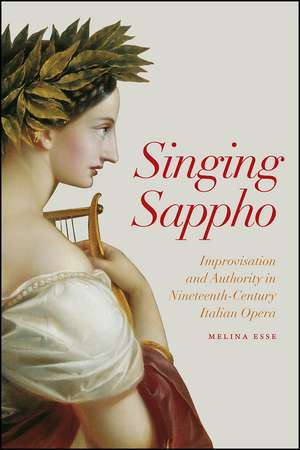Singing Sappho: Improvisation and Authority in Nineteenth-Century Italian Opera: Opera Lab: Explorations in History, Technology, and Performance
Autor Melina Esseen Limba Engleză Hardback – 6 apr 2021
Preț: 236.16 lei
Preț vechi: 333.36 lei
-29% Nou
Puncte Express: 354
Preț estimativ în valută:
45.19€ • 47.30$ • 37.61£
45.19€ • 47.30$ • 37.61£
Carte indisponibilă temporar
Doresc să fiu notificat când acest titlu va fi disponibil:
Se trimite...
Preluare comenzi: 021 569.72.76
Specificații
ISBN-13: 9780226741772
ISBN-10: 022674177X
Pagini: 224
Ilustrații: 15 halftones, 38 line drawings
Dimensiuni: 152 x 229 x 20 mm
Greutate: 0.43 kg
Ediția:First Edition
Editura: University of Chicago Press
Colecția University of Chicago Press
Seria Opera Lab: Explorations in History, Technology, and Performance
ISBN-10: 022674177X
Pagini: 224
Ilustrații: 15 halftones, 38 line drawings
Dimensiuni: 152 x 229 x 20 mm
Greutate: 0.43 kg
Ediția:First Edition
Editura: University of Chicago Press
Colecția University of Chicago Press
Seria Opera Lab: Explorations in History, Technology, and Performance
Notă biografică
Melina Esse is associate professor of musicology at the Eastman School of Music, University of Rochester.
Cuprins
Introduction
Chapter 1 History’s Muse: The Spectacle of Poetic Improvisation
Chapter 2 Corinna’s Crown: Improvisation and Authority in Rossini’s Il viaggio a Reims
Chapter 3 Divinely Inspired: Incantation and the Making of Melody in Bellini’s Norma
Chapter 4 Saffo’s Lyre: Improvising Operatic Authorship
Chapter 5 A Sapphic Orpheus: Pauline Viardot and the Sexual Politics of Operatic Collaboration
Acknowledgments
Notes
Bibliography
Index
Chapter 1 History’s Muse: The Spectacle of Poetic Improvisation
Chapter 2 Corinna’s Crown: Improvisation and Authority in Rossini’s Il viaggio a Reims
Chapter 3 Divinely Inspired: Incantation and the Making of Melody in Bellini’s Norma
Chapter 4 Saffo’s Lyre: Improvising Operatic Authorship
Chapter 5 A Sapphic Orpheus: Pauline Viardot and the Sexual Politics of Operatic Collaboration
Acknowledgments
Notes
Bibliography
Index
Recenzii
“With her perceptive readings, Esse illuminates the role of the improvvisatrice in nineteenth-century opera and the musical dimensions of improvisation. Revealing that nineteenth-century authorship was a fluid combination of creative, performative, collaborative, and contingent elements, she challenges an accepted narrative about the increasing dominance of the written work and the composer’s authority. This fascinating study is deeply relevant to literary-cultural studies as well as to musicology.”
“Esse’s new book makes a vital contribution to the continuing debates surrounding nineteenth-century Italian opera: it offers us important new ways of looking at the repertory and will surely take its place among the very best of recent operatic scholarship.”
“Esse argues brilliantly that the relationship between written and oral traditions is far more complicated than has hitherto been acknowledged. Her approach to this subject matter is unique, tracing the figure of Sappho, an ‘iconic improviser,’ through a series of operas and narratives. This book adds critical new perspective to the field of opera studies, illuminating how prima donnas helped shape and ‘create’ the musical and artistic environment in which they worked.”
"This work offers interesting insights into the role that female performative improvisatory techniques had on the creation of Italian and French opera in the 19th century. . . . Esse includes lengthy discussions of a number of unjustly neglected or underperformed operas, and—in what is probably a scholarly first—a reference to Dr. Seuss that is as delightful as it is unironic."
"In Esse’s retelling, Sappho comes alive again within her sexual and creative transgressions—no reading against required. This definition of queerness arguably better fits the political needs of the contemporary moment and offers more representation of lived, queer experiences. It is also, I think, something of a call to arms for musicologists, asking us to embrace Sapphic transgression to reconsider how we ourselves do our work."




